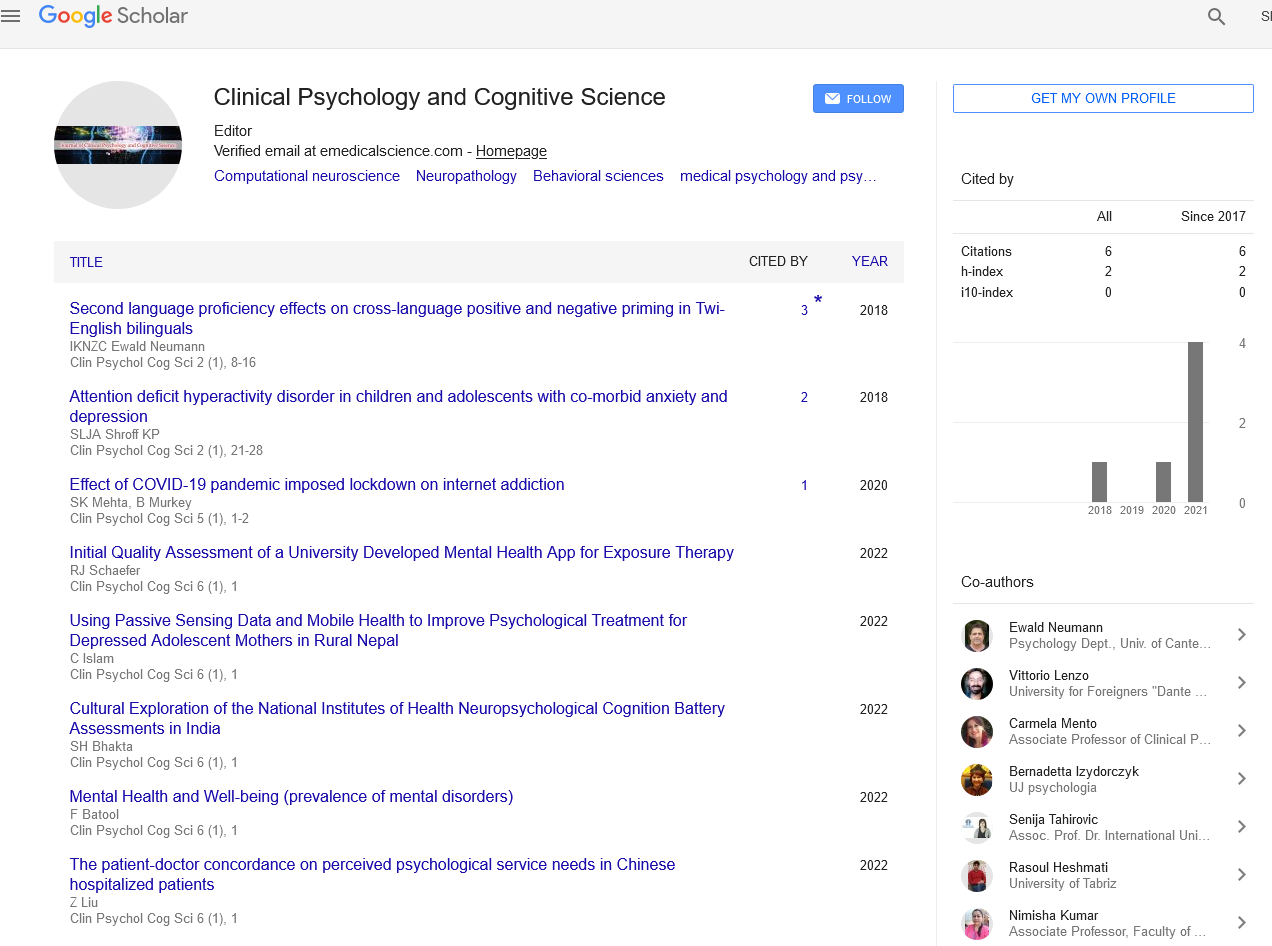Meaning structures can enhance mental health conditions: The perspective of the meaning-making model
Received: 30-Nov-2017 Accepted Date: Nov 30, 2017; Published: 08-Dec-2017
Citation: Krok D. Meaning structures can enhance mental health conditions: The perspective of the meaning-making model. Clin Psychol Cog Sci 2017;1(1):4.
This open-access article is distributed under the terms of the Creative Commons Attribution Non-Commercial License (CC BY-NC) (http://creativecommons.org/licenses/by-nc/4.0/), which permits reuse, distribution and reproduction of the article, provided that the original work is properly cited and the reuse is restricted to noncommercial purposes. For commercial reuse, contact reprints@pulsus.com
Editorial
Every illness, especially a chronic illness, strongly influences an individual’s mental processes and requires great force and determination in overcoming the limitations and difficulties of everyday life. Extensive research has demonstrated the significant role of meaning structures in ill people who often try to make sense of their hard and challenging experiences by relying on the important aspects of meaning systems, i.e. beliefs, values, and goals [1,2]. For instance, positive relations were found between search for meaning and psychological distress, anxiety and depression, and negative correlations between search for meaning and well-being indicators such as life satisfaction [3,4]. At the same time, research revealed search for meaning is not related to distress and a lack of well-being among people who also feel life is highly meaningful [5]. Examining the relationships between meaning in life, coping, and psychological well-being, [6] showed positive associations between presence of meaning and psychological well-being. However, no significant associations between search for meaning and psychological wellbeing were found.
The results suggest that ill persons’ personal resources based on meaning can enhance their psychosocial functioning during the time of illness. This is due to the motivational nature of these personal resources, which are largely based on the category of important beliefs and goals that enables ill people to form favourable behavioural patterns and overcome difficulties caused by illness. The mechanisms underlying the associations between meaning structures and mental health processes can be better understood in the framework of the meaning-making model, which has been successfully applied in the field of coping and health [3,7]. The model postulates that people possess orienting systems which provide them with cognitive frameworks enabling them to interpret their experiences and with motivation reinforcing personal capabilities. When people encounter difficult or challenging situations, they are inclined to appraise the circumstances and assign meaning to them.
Interactions between meaning structures and health may occur on two levels of meaning proposed by the model: global and situational [3]. Global meaning represents people’s general orienting systems and perception of various situations, and consists of beliefs, goals, and subjective feelings. Being strongly connected to motivation, global meaning can influence individuals’ thoughts, actions, and emotional responses in times of illness. Global meaning is often conceptualised as meaning in life. Situational meaning reflects meaning in the context of specific life events. It encompasses initial appraisals of the situation and the outcomes of revising global and appraised meanings. Situational meaning is generated on the onset of a potentially stressful event (e.g. illness or tragic events) and makes an impact on the ways in which individuals cope with their stress. According to the model, individuals’ perception of discrepancies between their appraised meaning of a specific situation and their global meaning generates distress, which entails efforts to reduce the discrepancy and ensuing stress [8,9]. Therefore, meaning making can characterise processes in which individuals try to reduce the discrepancy between appraised and global meaning in illness. The processes may occur through three different modes: altering either situational appraised meaning or global beliefs and goals, trying to find a more favourable understanding of the situation, and re-examining global beliefs and changing meaning in life.
By explaining mechanisms underlying changes in meaning structures, the model provides us with a satisfactory methodological tool to understanding cognitive and emotional processes relevant to mental health. The ability to construct meaning in times of illness appears to be very important as every illness is associated with significant changes in decision-making processes regarding goals and beliefs, and with re-examining previous life roles. Meaning structures may play the role of mental resources that empower ill people to use positive reappraisals, through which they can more positively construe the difficult situation on a basis of valuable goals and reinforce their sense of control. As a consequence, positive reinterpretations will lead to perceiving the illness and one’s life in less negative terms, and cause beneficial health effects.
REFERENCES
- Hansen JT. Meaning systems and mental health culture: Critical perspectives on contemporary counseling and psychotherapy. London: Lexington Books. UK. 2016.
- Winger JG, Adams RN, Mosher CE. Relations of meaning in life and sense of coherence to distress in cancer patients: A meta-analysis. Psycho Oncology. 2016;25(1):2-10.
- Park CL. The meaning making model: A framework for understanding meaning, spirituality, and stress-related growth in health psychology. The European Health Psychologist. 2013;15(2):40-7.
- Steger MF, Kashdan TB, Sullivan BA, et al. Understanding the search for meaning in life: Personality, cognitive style, and the dynamic between seeking and experiencing meaning. J Personality. 2008;76:199-228.
- Cohen K, Cairns D. Is searching for meaning in life associated with reduced subjective well-being? Confirmation and possible moderators. J Happiness Stud. 2012;13:313-31.
- Krok D. The role of meaning in life within the relations of religious coping and psychological well-being. J Religion Health. 2015;54(6):2292-308.
- Park CL, George LS. Assessing meaning and meaning making in the context of stressful life events: Measurement tools and approaches. J Positive Psychol. 2013;8(6):483-504.
- Park CL. Distinctions to promote an integrated perspective on meaning: global meaning and meaning-making processes. J Constructivist Psychol. 2017;30(1):14-9.
- Park CL, Gutierrez IA. Global and situational meaning in the context of trauma: Relations with psychological well-being. Counselling Psychology Quarterly. 2013;26:8-25.





